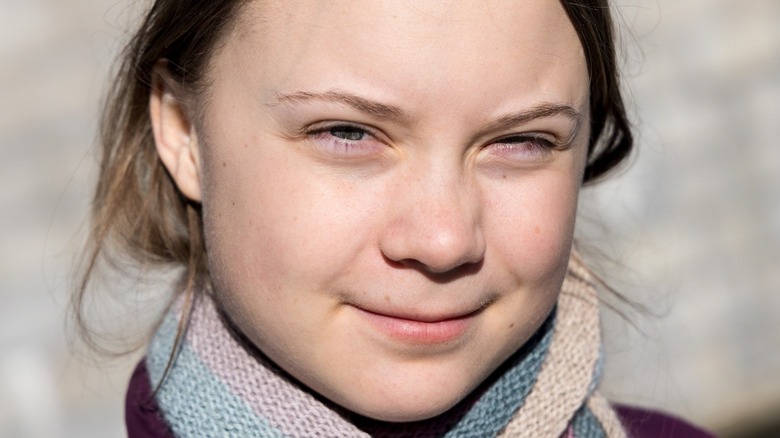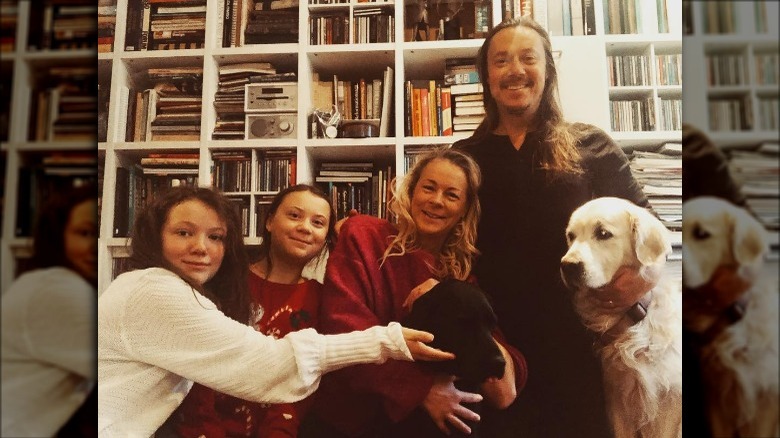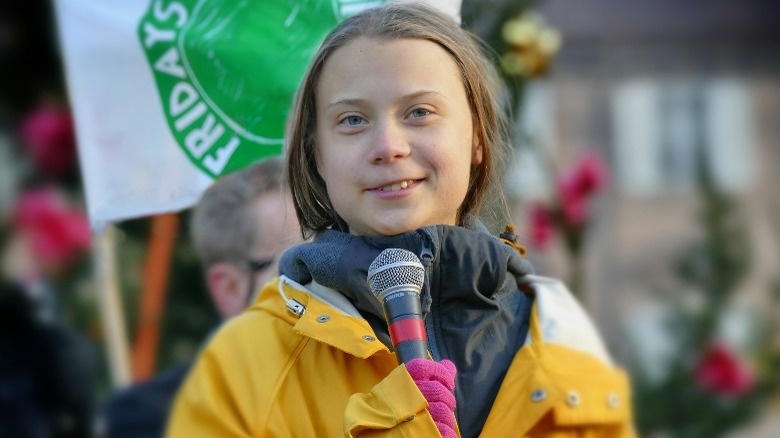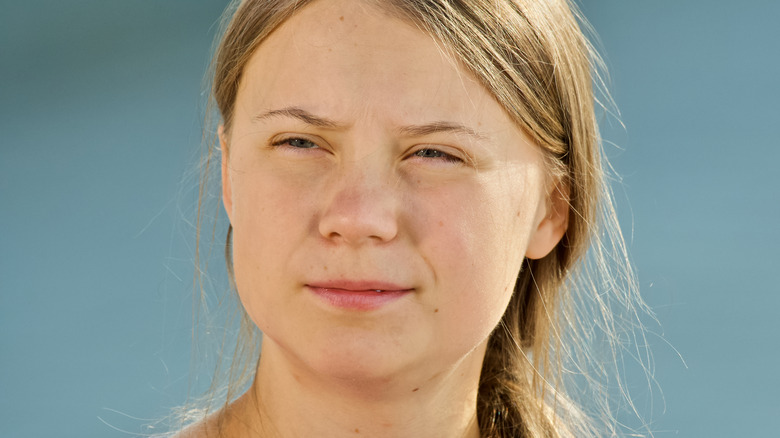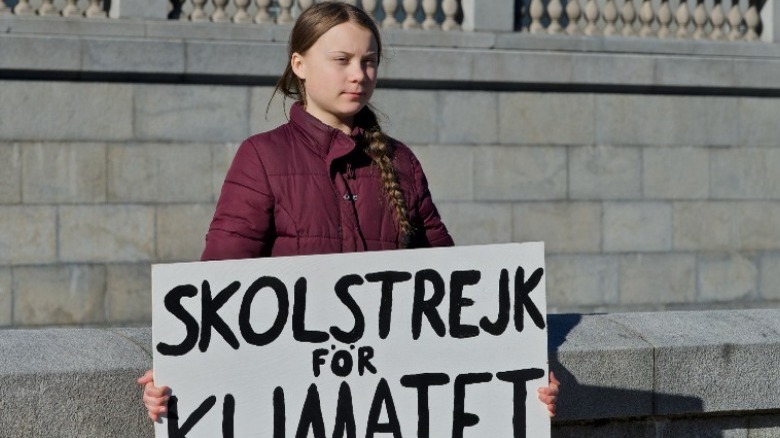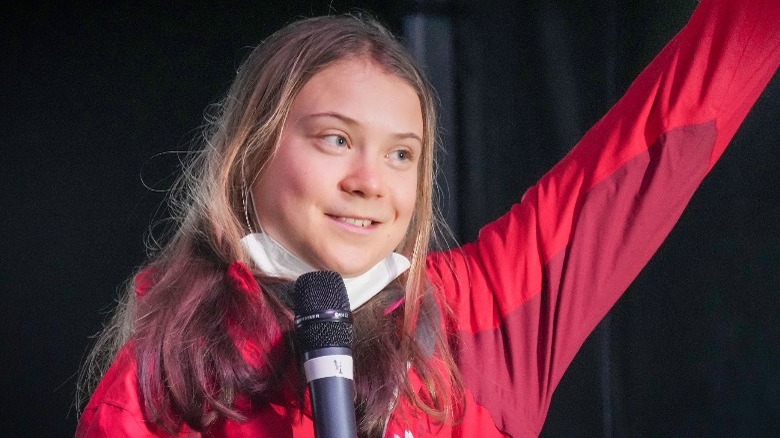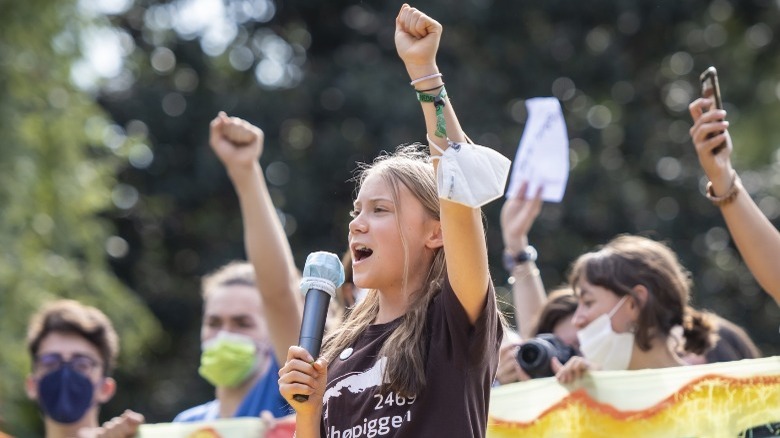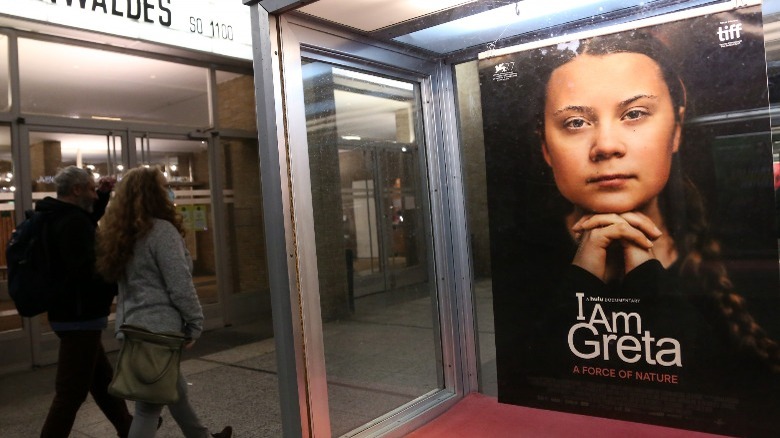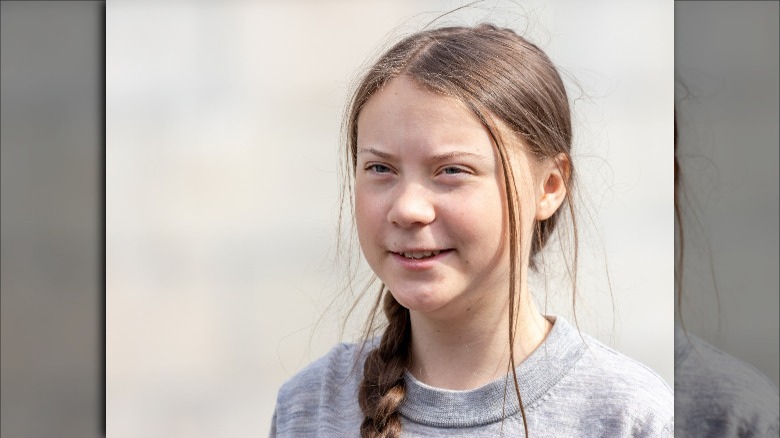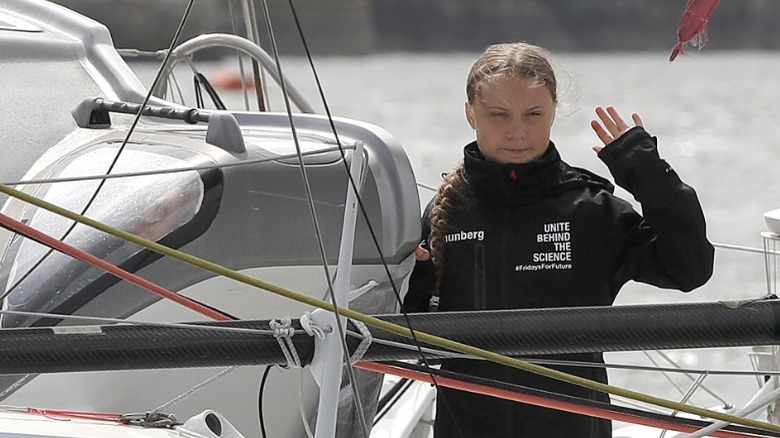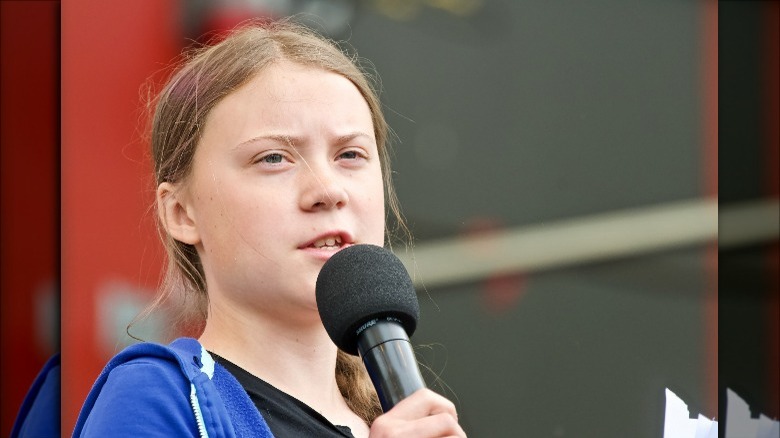Here's How Much Greta Thunberg Is Really Worth
It might seem strange to consider Greta Thunberg a celebrity when she has no interest in living her life as one. In fact, she once told her mother (via The Guardian), "Celebrities are basically to the environment what anti-immigrant politicians are to multicultural society." But despite her distaste for celebrity culture, the teenager — whom author Margaret Atwood once called the "Joan of Arc of the environment" (via Sky News) — has emerged as one of the most famous environmental activists in the world. Already in her short life she has been repeatedly nominated for the Nobel Peace Prize, crowned Time's 2019 Person of the Year, and recognized as one of Glamour's Women of the Year. She has undoubtedly proven her own quote, "You are never too small to make a difference."
But Thunberg doesn't get caught up in the attention her life's work has garnered. She consistently stays focused on what she became known for: Speaking the truth about climate change and urging some of the most powerful people in the world to take it seriously. While Thunberg's net worth is estimated to be around $1 million, according to Wealth Magnet, unlike most celebrities' fortunes we dive into, she's known for giving away her earnings to environmental causes.
Let's take a closer look at Greta Thunberg's financial life — or rather, her anti-financial life, as money seems to be the last thing for which she wants to be known.
Greta Thunberg's parents and upbringing
Greta Thunberg's parents both have a history of working in the arts. Her mother, Malena Ernman, is a famous opera singer in Sweden. Her father, Svante Thunberg, was formerly an actor and performer, as well. In their 2018 book, "Our House Is on Fire: Scenes of a Family and a Planet in Crisis," Ernman explains that her husband decided to give up his career to help raise their children and become what he called a "housewife." He told his wife, "You're one of the best in the world at what you do. ... Not to mention the fact you earn so d**ned much more than me."
Greta spent most of her childhood traveling around Europe with her parents and her younger sister, Beata Ernman. "We spent two months in each city and then we moved on. Berlin, Paris, Vienna, Amsterdam, Barcelona. Round and round. We spent the summers in Glyndebourne, Salzburg, or Aix en Provence," her mother wrote in her family's memoir.
While there are no public records of her parents' earnings, Careersinmusic.com lists the salary for an opera singer as ranging between $60,000 to $200,000. Since Thunberg's mother is a popular and highly sought-after talent in Sweden and beyond, it seems likely she gets paid on the higher end of the range. While she did co-author the abovementioned book, Malena Ernman made it clear in the preface that all proceeds "would go to Greenpeace, the World Wildlife Fund, and other non-profit organizations."
Her parents pay for most expenses
Greta Thunberg has been the target of an array of far-right conspiracy theories, many of them accusing her of being manipulated and funded by various organizations and politicians.
For example, climate-change skeptic Patrick Moore, who serves as the chairman of the CO2 Coalition's board of directors, called her a "full-blown tool of adults" in E&E News, alleging to the publication, "She is being abused by her parents, by Al Gore, by society at large that is on side with this ideology." Meanwhile, Trump-administration climate-change denier Steve Milloy tweeted in 2019, "She's ignorant, maniacal and is being mercilessly manipulated by adult climate bedwetters funded by Putin." The Putin claim was an especially odd one, considering the Russian president has made it clear he wasn't impressed by Thunberg.
But time and time again, Thunberg has insisted that adults stop acting like she can't think for herself. Addressing these claims on Facebook, she wrote in part, "There is no one 'behind' me except for myself. ... And I do what I do completely for free." Noting that she and her family haven't "received any money or any promise of future payments in any form at all" and that her "parents pay for tickets and accommodations" whenever she travels for her activist work, Thunberg added, "And of course it will stay this way. I have not met one single climate activist who is fighting for the climate for money. That idea is completely absurd."
Greta Thunberg used prize money to set up her non-profit
The Right Livelihood Award "recogniz[es] the actions of brave visionaries working for a more just, peaceful and sustainable world for all," according to the organization's website. It is also referred to as the "Alternative Nobel" because it was created after the founder "proposed two additional Nobel Prizes to the Nobel Foundation, one for environmental work and the other for promotion of knowledge," per The New York Times, which added that "when the foundation rejected the proposal," he financed the award's prize money himself.
Greta Thunberg won the award in 2019 for "inspiring and amplifying political demands for urgent climate action reflecting scientific facts," per the Right Livelihood's website. The prize money was $1 million Swedish Krona, which translates to about $100,000. Thunberg used this money to set up The Greta Thunberg Foundation, her non-profit. However, she has made it clear that she has no plans to become a philanthropist.
In a 2020 Instagram post, she explained in part, "There are no interests in philanthropy. It is just something that is needed for handling money (book royalties, donations, prize money etc) in a completely transparent way. ... The foundation's aim will be to promote ecological, climatic and social sustainability as well as mental health."
She donated her Human Act Award money to charity
According to its website, the Human Act foundation was started "with a wish to make a difference in the life of the millions of people living in extreme poverty." When the founders established the Human Act Award in 2020, Greta Thunberg was the first recipient. She was awarded the $100,000 prize money for "her fearless and determined efforts to mobilize millions of people around the world to fight climate change," per Human Act's website.
The full amount of money was donated to United Nations Children's Fund, an agency with the goal "to deliver the essentials that give every child an equitable chance in life: health care and immunizations, safe water and sanitation, nutrition, education, emergency relief and more" (via UNICEF USA). Human Act matched the donation, and UNICEF used the money to launch a campaign with Thunberg to fight for children's rights during the COVID-19 pandemic.
Thunberg said of the collaborative campaign, "Like the climate crisis, the coronavirus pandemic is a child-rights crisis. ... It will affect all children, now and in the long-term, but vulnerable groups will be impacted the most. I'm asking everyone to step up and join me in support of UNICEF's vital work to save children's lives, to protect health and continue education."
The activist also donated a $1.15 million prize
As of this writing, the most whopping amount of prize money Greta Thunberg has received came in 2020, when she won the Gulbenkian Prize for Humanity — which awarded her €1 million, which converts to about $1.15 million. Per its website, the foundation's chairman of the Grand Jury of the Prize said in a statement that the award recognized "the way ... Thunberg has been able to mobilize younger generations for the cause of climate change and her tenacious struggle to alter a status quo that persists," noting how this "makes her one of the most remarkable figures of our days."
"That is more money than I can begin to imagine," Thunberg later said in a video posted to Twitter, an understandable response from the then-17-year-old. "But all the prize money will be donated, through my foundation, to different organizations and projects who are working to help people on the front lines, affected by the climate crisis and ecological crisis," she went on to assure the public.
Thunberg stayed true to her word by donating the money to various causes. In a series of tweets, she explained that she would begin "with giving €100.000 to the SOS Amazonia Campaign led by Fridays For Future Brazil to tackle Covid-19 in the Amazon, and €100.000 to the Stop Ecocide Foundation to support their work to make ecocide an international crime."
Why Greta Thunberg turned down a lucrative award
In 2019, Greta Thunberg was announced as the winner of the Nordic Council Environment Prize for "breathing new life into the debate surrounding the environment and climate at a critical moment in world history," the council said in their official announcement of the prize. The award was 350,000 Danish dollars (about $52,000), but Thunberg — you might have guessed at this point — had no interest in the money.
While Thunberg thanked the council for the honor, she ultimately declined the cash. Per NBC News, the "fellow climate activists" who accepted the award for her at the ceremony read a statement from Thunberg, who explained her reasoning as, "The climate movement does not need any more prizes. What we need is for our rulers and politicians to listen to the research." According to the news outlet, it also wasn't the first award she had declined on moral grounds: Thunberg also didn't accept the Children's Climate Prize because "many of the finalists had to fly to Stockholm for the ceremony," and Thunberg is famously against flying due to the large amounts of carbon emissions that are caused by airplanes.
The lack of revenue from the I am Greta documentary
In 2020, a documentary was released about the young environmentalist titled, "I am Greta." The film was directed by Nathan Grossman and was met with mostly positive reviews, earning an 80% score on Rotten Tomatoes. According to Box Office Mojo, the doc grossed $360,747 during its cinema run, which included a small number of 81 theaters across the globe. However, the documentary reached a far wider audience through Hulu, where it has since exclusively streamed.
But don't get it twisted, none of this has led to Greta Thunberg's bank account increasing. She took to Instagram that October to set the record straight on her lack of financial gain from the film, saying, "Just to be clear once again: I — nor anyone in connection to me — have or will not receive any payment for this." The activist added, "B-Reel Films will dedicate half of the film's revenues to my foundation and all of that will be donated to organizations and projects fighting for a sustainable world, defending nature and supporting people already facing the worst impacts of the climate — and ecological crisis."
She does not buy into consumerism
Bad news for those who love shopping: Consumerism and climate change go hand-in-hand. Yup, it turns out that our culture of consumption isn't doing much for the planet, and the fashion industry alone "accounts for around 10% of greenhouse gas emissions from human activity," per BBC.
So, it's only natural that Greta Thunberg would avoid buying new products at all costs (no pun intended). She is even opposed to companies who claim to be "green" or "sustainable," explaining in part on Twitter in 2021, "You cannot mass produce fashion or consume 'sustainably' as the world is shaped today. That is one of the many reasons why we will need a system change." In the same Twitter thread, Thunberg specifically called out clothing companies by stating, "The fashion industry is a huge contributor to the climate-and ecological emergency, not to mention its impact on the countless workers and communities who are being exploited around the world in order for some to enjoy fast fashion that many treat as disposables."
Accordingly, you won't find this activist at the mall or scrolling through online shops. "I don't need new clothes," Thunberg told The Sunday Times in 2021. Likewise, she admitted to Vogue Scandinavia that same year, "The last time I bought something new was three years ago and it was second-hand. I just borrow things from people I know."
Greta Thunberg doesn't travel like a typical celeb
The air travel industry is reportedly responsible for "around 5% of global warming," per BBC. As such, Greta Thunberg is vehemently against air travel and refuses to get on an airplane, as previously mentioned. She even famously took a two-week boat trip across the Atlantic to speak at the UN Climate Action Summit in New York City in 2019.
Even though "flight-shaming" is attributed to her, she told The Sunday Times in 2021, "Fly if you like, I won't judge you." But Thunberg does ask that others, especially those in powerful positions, set a good example if they consider themselves activists for the planet. "You don't stop flying, you don't stop consuming or you don't go vegan because you want to lower your own individual carbon footprint. ... We do it because we want to influence the people around us," she explained to Vogue Scandinavia.
Hypocrisy can also do a lot to harm the movement, Thunberg noted, saying, "Of course I'm not saying that celebrities shouldn't fly in private jets — as I make a point of never ever telling anyone what to do, but we need to understand that by doing so we may lose some people who won't believe in what we are saying."
Real estate is not a priority in Greta Thunberg's world
Despite the fact that Greta Thunberg has reached celebrity status, she's notably avoided living like one and has even had to be careful of drawing too much attention to herself due to an unfortunate amount of haters. In the 2021 docuseries, "Greta Thunberg: A Year to Change the World," she told the BBC that people had "sent death threats to me and my family," per Express. "I don't mind the hate," the activist continued. "I don't care what people say about me. But It's just that when it becomes, like, physical and when it affects your family, that's a whole other different story."
Because of the death threats, Thunberg has spent much of her time in a "safe house," according to The New Yorker. The publication explained: "She was in a borrowed apartment in Stockholm, where, for more than a year, she's lived with her father and her two dogs. Her mother and sister live in the family's apartment, and everyone shuttles back and forth, in a kind of witness-protection program to avoid run-ins with Thunberg's critics."
As of October 2021, Thunberg was living away from her parents for the first time, but still didn't have a place of her own. In an interview with UN Dispatch, she said her new place was "a borrowed flat," where "people come and go a bit." Clearly, real estate is one of the many earthly goods we won't be seeing Greta Thunberg invest in anytime soon.

